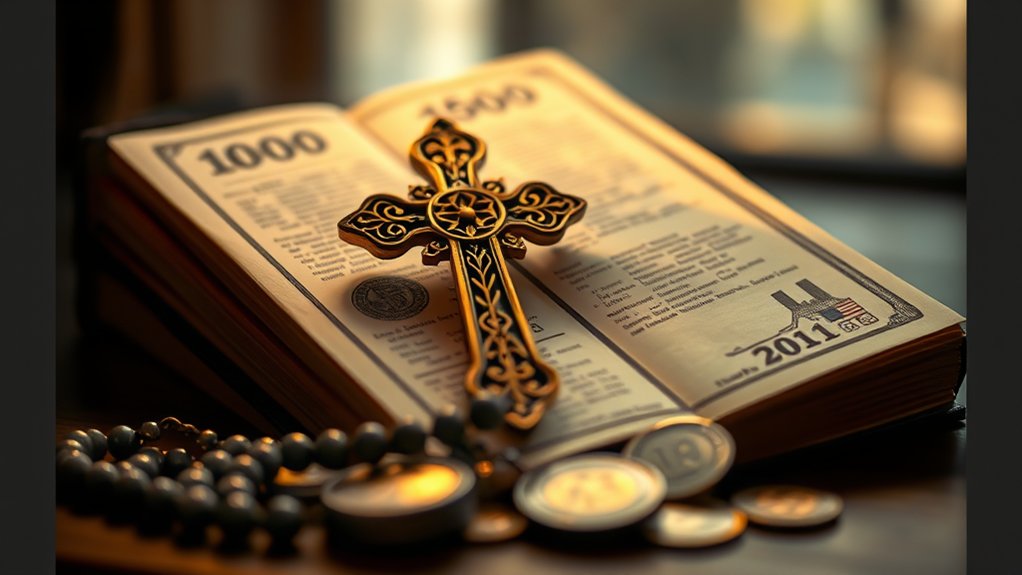Key Takeaways
- Spiritual beliefs can guide financial decisions throughout the week, not just on Sundays.
- Aligning finances with core values such as generosity and mindfulness fosters ethical and responsible wealth building.
- Faith-driven money habits can positively impact both personal finances and the broader community's future.
The Interplay Between Faith and Financial Choices
Imagine your financial life as a garden where spiritual beliefs act as the sunlight, nurturing it to grow in balance and abundance. Faith isn't just a Sunday thing; it silently influences your wallet decisions all week.
It promotes dollar choices that mirror core values like generosity and mindfulness. By aligning finances with these beliefs, you build wealth ethically and responsibly.
Intrigued to learn how faith can impact your money mindset and your community's future?
The Role of Faith in Financial Decision-Making
When faith becomes a part of how you handle money, it does more than just fill in the gaps—it creates a strong moral foundation for all your financial choices. Faith influences your perspective by weaving a moral framework into your financial decisions. This means your decisions are guided not just by numbers but by values. Think about spiritual beliefs focusing on resource management and stewardship, shaping the way you view saving and spending. Just like the Israelites' journey to the Promised Land required trust and perseverance, applying faith to financial decisions demands belief in a higher purpose and adherence to spiritual principles. Engaging in faith-based financial planning often reflects stewardship principles, emphasizing that all possessions belong to God. People may find blending prayer and meditation into financial planning increases mindfulness, helping align spending with deeper values. Did you know that some find comfort in using faith-based approaches for ethical financial planning? It's like having an inner compass directing you towards decisions aligning with your spiritual and financial goals. With faith's influence, you're not just chasing wealth; you're building financial success that resonates with deeper spiritual fulfillment.
Ethical Investing and Spiritual Principles
Ethical investing isn't just about making money—it's about aligning your investments with your spiritual values and convictions.
By choosing investment strategies based on ethical principles, you're prioritizing more than just profits. Consider how Biblically Responsible Investing helps you evade industries that contradict these values, like gambling or alcohol. It supports human rights and environmental stewardship, promoting companies that care for creation and uphold justice.
You might explore positive impact investing, which focuses on renewable energy and advancing human dignity through education or healthcare.
Using tools like BRI mutual funds or seeking advice from financial advisors skilled in these practices can help maintain a diversified, value-led portfolio.
Cultivating Generosity and Frugality Through Faith
While life often throws financial challenges your way, tapping into your faith can guide you in cultivating generosity and frugality. You'll find that biblical principles of sacrificial giving and mindful spending help shape your approach to finances. By recognizing that everything belongs to God, you're encouraged to practice stewardship, making choices that honor His ownership.
Tithing becomes a spiritual act, reflecting gratitude and reinforcing your commitment to supporting your community. Embracing frugality doesn't mean denying yourself but rather making conscious spending decisions that prioritize spiritual growth and relationships.
For instance, economic organization is a concept that can further enhance your financial stability, just as it empowers communities through collective strategies. This mindful approach also reduces impulse purchases, allowing you to use resources effectively for family and community needs. Your faith-driven financial habits can inspire contentment, leading to a fulfilling and balanced life.
Conclusion
Cultivating Financial Habits Through Faith
Like a gardener nurturing their plants, your faith can significantly influence your financial decisions, steering you toward a prosperous financial future. Consider the example of a church community in Harlem that invested in local businesses, transforming vacant lots into flourishing urban gardens. This narrative underscores how spiritual values can reshape financial behaviors, encouraging stewardship and generosity. By prioritizing ethical investments and mindful spending, you're not just safeguarding your personal future; you're also sowing seeds that uplift and enrich the whole community. Now, go ahead and let your faith guide your financial journey, creating a positive impact for yourself and those around you.










